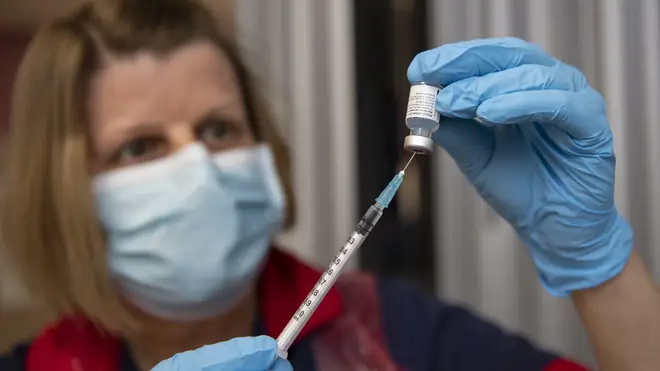
Henry Riley 4am - 7am
17 January 2021, 22:29 | Updated: 18 January 2021, 16:44

The rapid expansion of Covid jabs to the over-70s and clinically extremely vulnerable could see an end to the toughest lockdown measures by March, the vaccines minister has said.
Nadhim Zahawi said that immunity from the vaccine takes effect in two to three weeks, depending on which jab the patient has, and will mean that a "gradual" easing of restrictions could be possible "after the middle of February where we've protected those top four cohorts".
But he warned that it is not yet known how the vaccine impacts infection rates and to what extent it stops transmission of the virus - if at all.
Read more: Lockdown review date: When does lockdown 3 end? Start and finish date revealed
Read more: 24/7 Covid vaccine clinics to be piloted within weeks, minister tells LBC
He said: "If we take the mid-February target, two weeks after that you get your protection pretty much for the Pfizer BioNTech (jab), three weeks for the Oxford AstraZeneca, (then) you are protected.
"That's 80% of mortality.
"One of the things that we don't know yet - and the deputy chief medical officer Jonathan Van Tam is on record as saying 'look give me a couple of months and I'll tell you' - is the impact of the vaccine on transmission rates, i.e. infecting people.
"So that will become apparent. So there are a number of caveats that, obviously, stand in the way of us reopening the economy."

Zahawi: Mid-Feb target of offering vaccine to most vulnerable
More than 3.8 million people - including over-80s, care home residents and NHS and social care staff - have already received their first dose of a Covid-19 vaccine, but from Monday it will be rolled out in the next two priority groups in England.
The Government said it would remain the priority to vaccinate those in the first two groups, but that sites which have enough supply and capacity to vaccinate more people will be allowed to offer jabs to the next two cohorts.
Boris Johnson has pledged to offer vaccinations to the first four priority groups by the middle of next month, while Dominic Raab said on Sunday that all adults would be offered a first dose by September.
Read more: What are the categories and tiers for the Covid-19 vaccine?
The Prime Minister said: "Today is a significant milestone in our vaccination programme as we open it up to millions more people who are most at risk from Covid 19.
"We are now delivering the vaccine at a rate of 140 jabs a minute and I want to thank everyone involved in this national effort.
"We have a long way to go and there will doubtless be challenges ahead - but by working together we are making huge progress in our fight against this virus."

Dominic Raab: 'Light at the end of the tunnel' in pandemic fight
Detailing the plans, Health Secretary Matt Hancock said: "Now that more than half of all over-80s have had their jab, we can begin vaccinating the next most vulnerable groups.
"Where an area has already reached the vast majority of groups 1-2, they can now start opening up the programme to groups 3-4.
"We are working day and night to make sure everyone who is 70 and over, our health and social care workers and the clinically extremely vulnerable are offered the vaccine by the middle of February and our NHS heroes are making huge strides in making this happen.
"This measure does not mean our focus on getting care homes, healthcare staff and those aged 80 and over vaccinated is wavering - it will remain our utmost priority over the coming weeks to reach the rest of these groups."
Ten further mass vaccination centres will open in England this week, with more than a million over-80s invited to receive their coronavirus jab.
Blackburn Cathedral, St Helens rugby ground, Norwich Food Court and a park-and-ride outside York are among the new locations where large-scale vaccination will take place from Monday.
NHS England said they will join the seven existing mass vaccination sites across the country, alongside a thousand GP-led surgeries and more than 250 hospitals already providing jabs.